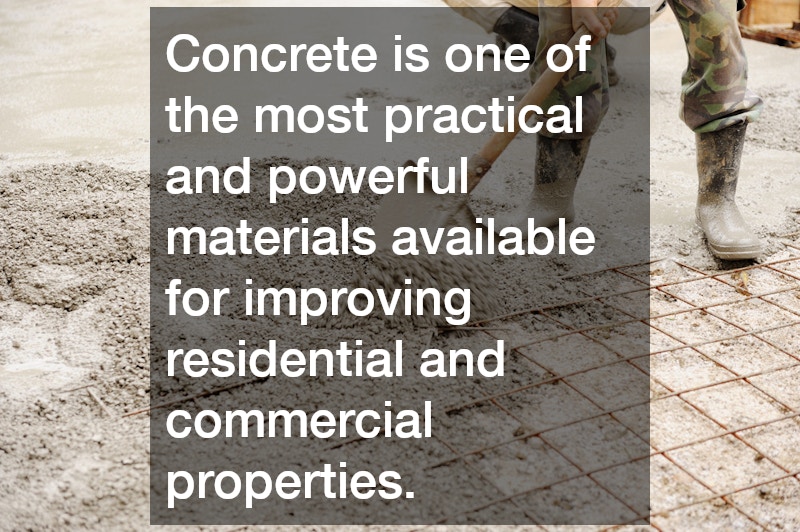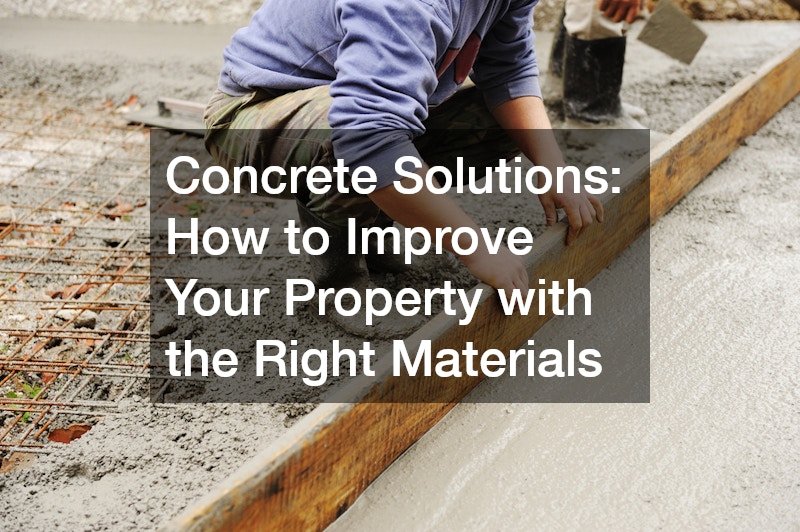When considering upgrades to your home or commercial property, one material stands out for its durability, affordability, and flexibility—concrete. Often underestimated in design potential, concrete has become one of the most popular materials used in construction and landscaping projects of all sizes. Whether you’re planning a driveway, patio, retaining wall, or foundation, understanding the benefits of concrete can help you make more informed decisions and ultimately improve your property’s function and appearance.
The Many Faces of Concrete
One of the most impressive features of concrete is its versatility. Gone are the days when concrete was only used for basic gray slabs. Today, homeowners and commercial property owners have countless design options. Concrete can be stamped, stained, polished, or colored to replicate more expensive materials like brick, stone, or even wood. This makes it an attractive choice for anyone looking to upgrade their outdoor space without breaking the bank.
Concrete also works well for both horizontal and vertical applications. You’ll find it in driveways, patios, sidewalks, walls, countertops, and decorative features like planters and fire pits. The ability to customize concrete into nearly any shape or style means it can be adapted to suit both modern and traditional aesthetics, blending seamlessly with any architectural style.
Strength and Durability That Last
Durability is where concrete really shines. Properly poured and cured concrete can last for several decades with minimal maintenance. Unlike materials that degrade due to weather, rot, rust, or insect damage, concrete is inherently resistant to these problems. This makes it particularly ideal for use in areas exposed to the elements or high traffic.
Because of its compressive strength, concrete is commonly used for foundational work. Structures built on concrete foundations remain stable and safe for generations. Moreover, concrete is non-combustible, making it a safe option for fire-prone areas and enhancing the overall resilience of your property.
Economical and Low Maintenance
While the initial cost of a concrete project might be higher than some alternatives like asphalt or gravel, the long-term savings make it a smart investment. Concrete requires little maintenance and is easy to clean. Occasional sealing or power washing can keep it looking great for years. You won’t have to worry about frequent repairs or early replacements, reducing overall lifecycle costs.
The speed of installation can also reduce labor costs, especially for standard concrete pours. Whether you’re hiring professionals or doing the job yourself, you’ll benefit from a streamlined process that gets results quickly and efficiently.
Environmental Considerations
Concrete can be a surprisingly eco-friendly material. Modern advances in manufacturing have made it possible to use recycled components in the mix, such as fly ash or ground granulated blast furnace slag. These alternatives reduce the demand for virgin materials and minimize waste.
Additionally, concrete’s thermal mass helps regulate indoor temperatures in buildings, reducing the need for constant heating or cooling. This can contribute to lower energy bills and a smaller carbon footprint over time. Once its useful life ends, concrete is fully recyclable and can be crushed and reused as aggregate in new projects.
Boosting Property Value and Curb Appeal
Improving your property with concrete isn’t just about functionality—it’s also about aesthetics and value. A well-designed concrete driveway or patio adds significant curb appeal, which can positively influence property appraisals and buyer interest. Decorative concrete in outdoor entertainment areas or entryways creates an inviting and modern look that makes your property stand out.
Commercial properties benefit as well. Clean, crack-free walkways, parking areas, and entry zones create a more professional appearance and reduce liability concerns. Investing in high-quality concrete features now can lead to increased property value and appeal in the future.
Working with the Right Professionals
Although concrete is an accessible material, getting the best results requires skilled craftsmanship and proper planning. Hiring a reputable contractor ensures your project is done correctly, from the mix and reinforcement to the pour and finishing. Discussing your goals with a professional helps you select the best concrete type and finish for your needs.
Before starting any concrete project, take time to evaluate the scope of work, permits required, and timeline. By doing this early, you can avoid unexpected costs and delays.
Concrete is one of the most practical and powerful materials available for improving residential and commercial properties. Its unmatched strength, versatility, and aesthetic options make it an ideal choice for a wide variety of applications. From decorative patios and walkways to foundational structures and retaining walls, concrete delivers durability and value that lasts for decades.
Whether you’re looking to refresh your outdoor space or start a major construction project, consider the many advantages that concrete can offer. With the right materials and team behind you, your property improvements can be both functional and beautiful for years to come.
.

